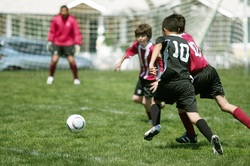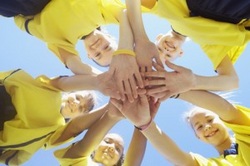- "Apart from being a source of entertainment and physical fitness, sport is a powerful social and educational tool in achieving goals on development and peace" -Expert Panel

According to experts, sport is a powerful educational tool in developing life skills and promoting tolerance, understanding and gender equality. Through sports children are educated. Sports play an important role in promoting tolerance, understanding, and gender parity among people. Studies show that a significantly greater percentage (62 percent) of children participating in programs report feeling good about themselves, compared with other children not participating in regular sport and play activity (49 percent). Sport and play are essential development building blocks, helping to foster healthy physical, social and emotional development. Nothing else has the universal appeal of sport—it crosses ethnic, cultural, gender, and linguistic lines. Sport has the power to reach and teach like no other medium.
Competition
Sports are useful for teaching children many important skills. One of these skills is competition. In today's world we are surrounded by competition. Where children mostly face competition in academics and sports, adults face competition when they are applying for and keeping jobs. Participating in competitive team sports at an early age gives children an opportunity to understand the healthy aspects of competition in a friendly environment. Students of all ages who participate in sports have been found to cope better with competition in other areas of their life.
Team Sports

Team sports provide children with many opportunities to grow physically and socially, as well as emotionally. Physical activity with their peers allow children to build social skills through peer interaction. Child development experts note that children become interested in team sports around ages five through six. If children learn the importance of cooperating with their peers at a young age, they will be more socially ready for kindergarten and grade school. It is important that cooperation over competition in team sports is emphasized to children at a young age. Children's motivation to participate in team sports moves from a focus on competition in early childhood to one on cooperation and friendship by the late elementary school years.
Physical Benefits
Children who are actively involved in a sport are more likely to describe themselves as being in good physical health than students who do not participate in sports. Also, athletically active youth are more likely to be nutrition-conscious in their food choices than children who are not actively involved in a sport, therefore not only are the children gaining the health benefits of participating in a physical activity, but they are also maintaining healthier diets.
Social Benefits

The social benefits are equally as important, if not more than the health benefits that sports provide. The social benefits may be what draw children to sports. Being able to spend time with their friends outside of school is more important to children than knowing they are physically active. Life skill gains through social interaction can be tremendous. The social interaction in team sports teaches children to associate with their peers, efficiently solve conflicts, and communicate with peers.
Emotional Benefits
Sometimes, the emotional development of youth is hindered because of the physical and/or emotional absence of parents. Sports provide youth with opportunities to interact with a caring and supportive adult. The interaction a child has with his or her coach helps to improve self-esteem as well as lower the chance of depression.
